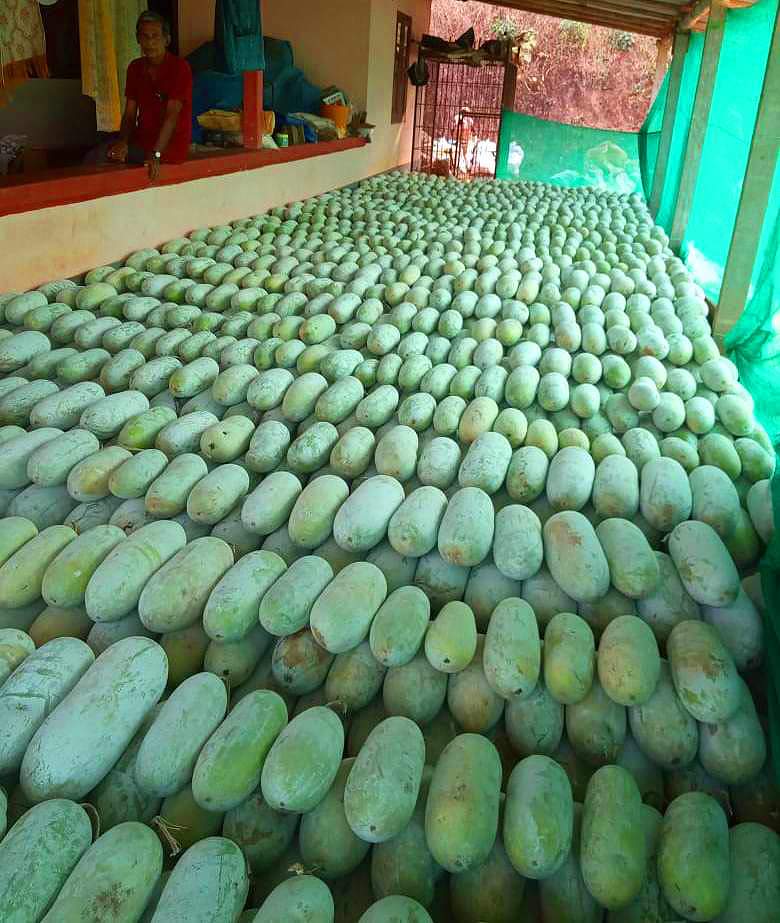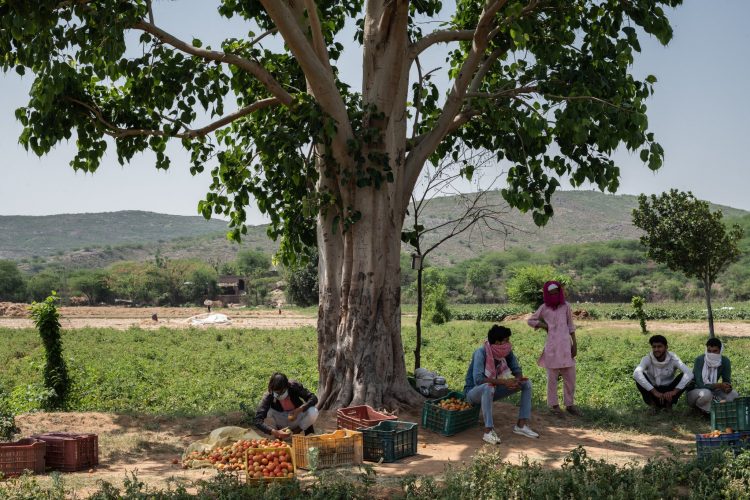Food And Rights Talk is a series of interviews with PAN Asia Pacific (PANAP) partners across the globe to find out the situation of rural peoples, in relation to food security and human rights, amid the COVID-19 pandemic.
In the first of this series, we interview Poguri Chennaiah, national secretary of APVVU (Andhra Pradesh Vyavasaya Vruthidarula Union), one of the largest federation of unions of agricultural workers and marginalized farmers in Southern India. Chennaiah is also the president of the Asian Peasant Coalition.
PANAP: What is the situation now of farmers and agricultural workers in India, particularly in the state of Andhra Pradesh?
Chennaiah: Since the lockdown, farmers could not harvest their crops because the workers are not going to their fields. There is so much police harassment. Even if they want to do some work, police are beating people up. Agricultural workers are also really suffering because of not being able to get employment outside of their village. Only recently the government has relaxed its policy for agricultural work, but because of the panic that has been created, workers are now scared to go outside to work.
The government promised to give food grains one week after the lockdown. But the government took 10 days before they were able to deliver. During these 10 days, farmers and agricultural workers suffered a lot because they don’t have any surplus to keep in their homes. Now the government has given 5 kgs of rice per head, 1 kg of sugar, 1 liter of oil and INR (Indian rupees) 1,000 in cash per family. These just cover the bare minimum of their needs. They don’t have vegetables, the spices that they use for curries. These relief materials are also only offered to those who have cards—those cards that government gives to people who they classify as living below the poverty line. But in Andhra Pradesha alone, there are 157,000 families who don’t have cards but are below the poverty line. They are not given the same equal treatment. It’s a terrible situation.
Another concern is that the government didn’t give farmers any opportunity to sell their produce—there are no facilities provided for marketing. So they didn’t harvest. I can tell you, in summertime, tomatoes in Chittoor generally costs INR 50 per kg. Now it sells for INR 2. Farmers cannot even recover their cost for harvest labor, let alone transportation costs and other investments they had made. So the farmers let the tomatoes just sit in the fields. Another example is milk. With Andhra Pradesh being a drought region, people depend a lot on milk. Rural families sell milk everyday to the milk dairies and earn around an average of INR 500 per day. Now they can’t get anything because there is no market. They cannot drink 5 to 10 liters per day in the home, you know.
The government said that they have relaxed the rules on markets. Markets can open for a limited time and people can transport goods from 6 to 11 o’clock in the morning. The problem is, people who live far away from the marketplace cannot transport their goods. Within one hour they have to sell their produce, then run back to their villages before the lockdown. So it is nearly impossible for the farmers to do all these. They get delayed by even just 5 minutes, the police comes and beats them up. If they’re going by bullock cart, the police will beat the farmer driving the bullock cart.
Meanwhile, rural workers employed under the Mahatma Gandhi National Rural Employment Guarantee Act (MGNREGA)–a 100-day government employment program for the poor where they do public works such as digging canals—have been abandoned. They didn’t get one month’s worth of backwages. There is currently no work for them because farmers are not allowed to employ these workers.

PANAP: So how then are they surviving?
Chennaiah: The rural poor are just depending on the 5 kilos of grains—without any other ingredients—to fill their bellies. That is the only way they’ve been surviving. The government says we’re attending to every family. But in the states of Andhra Pradesh and Telangana, that is simply not true.
PANAP: How about vegetables in their farms, can they survive on that?
Chennaiah: If within their village there are vegetable growers, then local families can get them freely. But it is not in every village that people grow vegetables because it depends on the water availability and all that. The problem is, each village is blocked from the entry of other villagers. Villages are closing the village roads, by felling the trees across the road and all that. A villager cannot go to another village. If they do, people in the other village will shout and send them back.
PANAP: Do rural people have access to health care and testing kits for COVID-19?
Chennaiah: Government doesn’t have enough equipment for testing in all the Primary Health Centers. But to some extent, India’s primary health care system is better compared to other countries, despite the continuing problems of corporatization and privatization. In every district, two to three centers are established for testing. So whenever the government gets to know from the PHCs that there are patients with coronavirus symptoms, immediately they are linked to the testing centers in district hospitals. Testing and health services are better here in the Southern states such as Andhra Pradesh, Telangana, Kerala, and Karnataka, compared to Northern Indian states.
PANAP: How is the food security situation in urban areas?
Chennaiah: Urban areas are equally bad for the poor who are unregistered or do not have the card. They are really suffering, because government is not supporting them the way they are supporting the cardholders. The lockdown was announced only 4 hours before it was implemented. This left 20 million inter-state migrant workers stranded in various urban centers. They are shelterless, without food and benefits. So we are pushing government to provide them proper relief packages. Right now migrant workers are accomodated by in schools, public buses and train compartments. The situation is terrible becuase of lack of access to water and electricity. The temperature in India is now 40 degrees so you can imagine in the railway compartments and buses, without A/C, it is like being boiled inside.
PANAP: Have you documented any rights abuses among your constituents during this lockdown period?
Chennaiah: In one factory premises in the special economic zone of Sri City, 187 families were stranded without food. We informed the authorities and after a long bureaucratic process, 15 days after the lockdown, each family received aid. But it was only 1 kg rice each— they are supposed to be given 5 kgs. So you can imagine the suffering these families went through, and still not getting what they were due.
Also one of our union secretaries in the coastal areas was beaten up by the police. Despite an official identity card and permission to do service, the police officials, upon finding out that he is Muslim, started beating him up very badly. They accused him of carrying the virus and told him to go back to home. His vehicle was also confiscated, and they broke its glass windows. These kind of cases are rampant.
The context is that there was this one Islamic meeting in Delhi where around 1,400 people from Andhra Pradesh and Telangana went and got infected. Because of that, there is so much discrimination against Muslims across the country. Everybody looks at them as carrier of the virus. Most street vendors of fruits and vegetables, meat and fish are Muslims. Now, you will see that there will be no people in the meat shop that belongs to Muslims, but there will be crowds in the non-Muslim shops. There had always been discrimination against minorities—led by the media, politicians, and religious fundamentalists. But now with this, everybody is looking at Muslims as carriers of the virus. This is a very dangerous situation.
PANAP: What are your demands?
Chennaiah: APVVU wrote a letter to the governments of Andhra Pradesh and Telangana, asking them to provide food grains and cash sufficient for all days of the lockdown. We also demanded to distribute this aid to all eligible people, irrespective of having cards or not. Because it is the failure of the government for not issuing them cards when it’s their responsibility to take care of the poor. Government should also release all back wages of MGNREGA workers, and continue to provide them 100 days employment. They can still maintain social distancing while doing community work.
The government should plan the budgetary allocation for health in proportion to people living in rural areas. Sixty percent should go to rural areas because 60% are living in rural areas—budget can be used for infrastructure building for primary health care. Workers should also be linked to state insurance schemes so that they can get free health care.
PANAP: It is said that we have entered or are entering a global recession brought on by the pandemic. How do you think the Indian government should respond to this?
Chennaiah: The government should increase the budget allocation to agriculture—and to sustainable agriculture, not corporate agriculture. That is one long-term demand for food security. Globally, it is really going to be a really big problem, economies are going to collapse. So the Indian government must provide support mechanisms for workers and farmers. If not, suicide cases will multiply. We want the government to plan properly for the future of workers.###








Discussion about this post